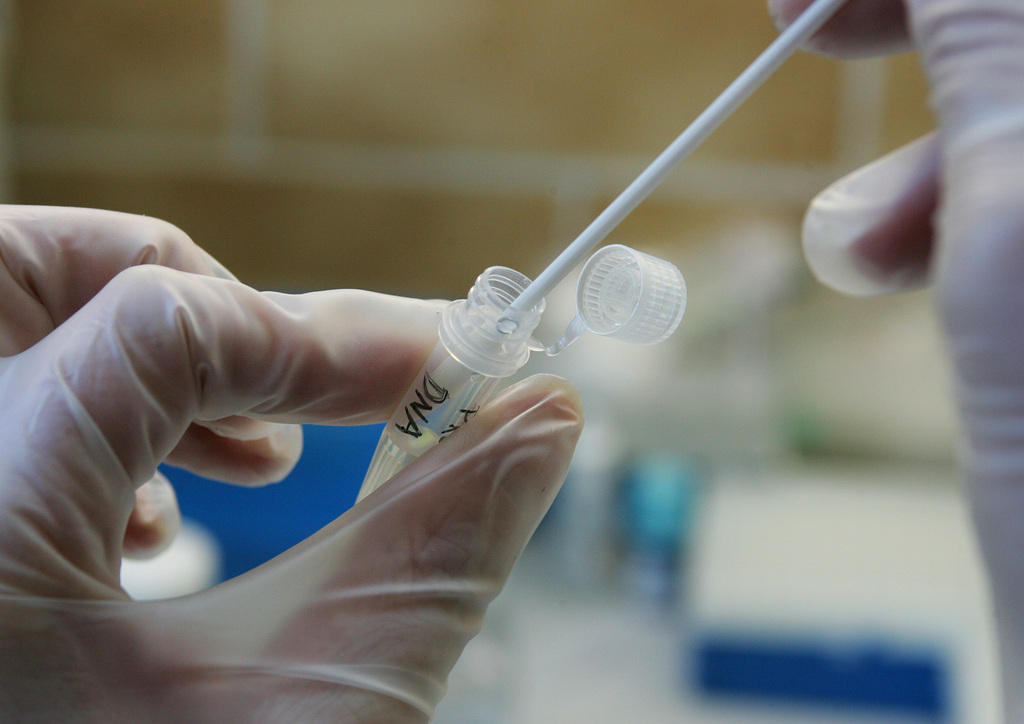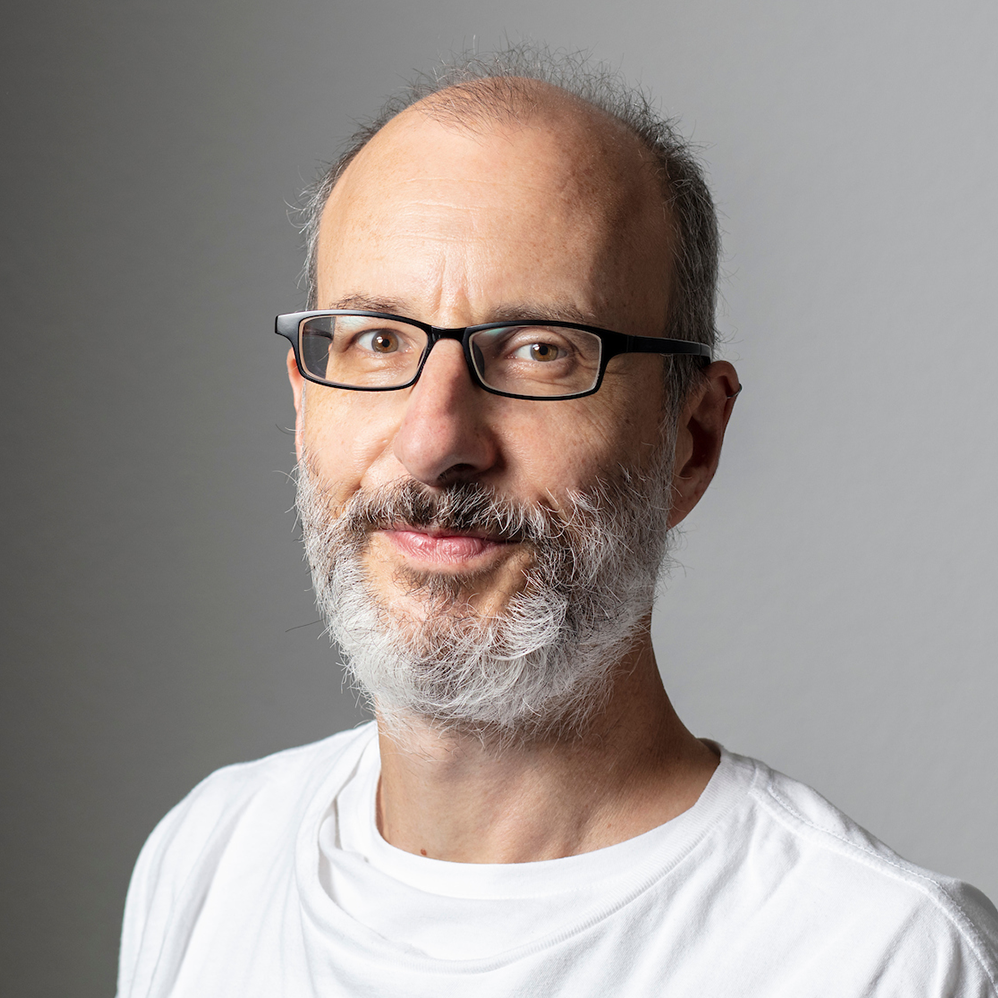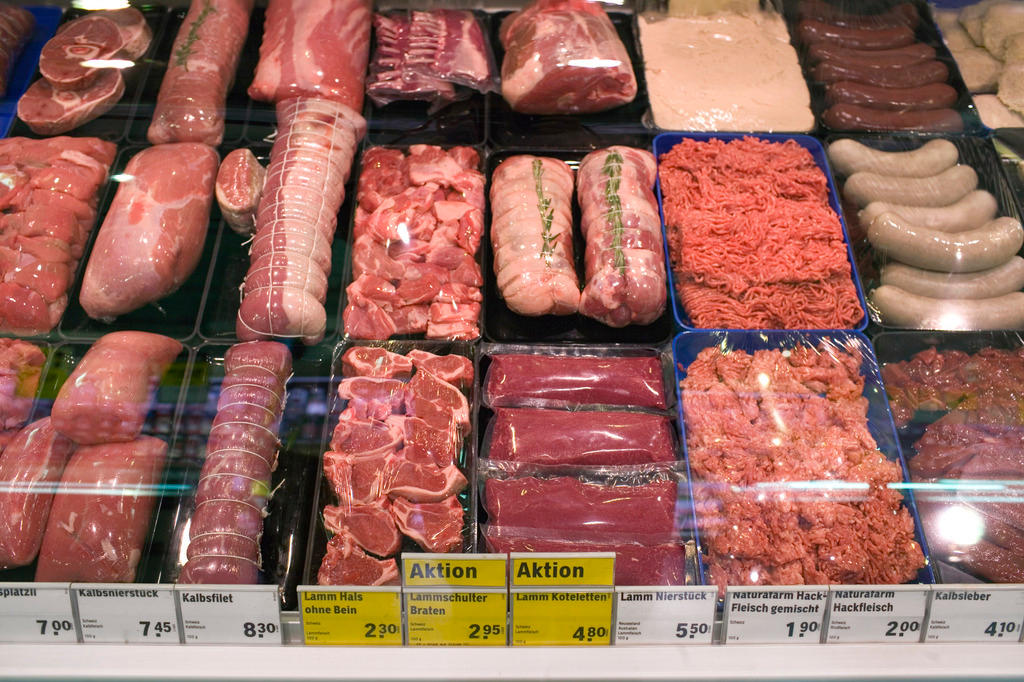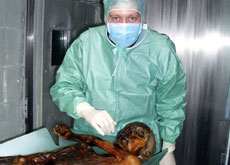When a saliva sample changes your life

A Swiss couple undertook DNA testing as a matter of fun but ended up solving a rather serious, trans-Atlantic family mystery. As more people turn to genetic analysis to unlock the Pandora box of the past, Switzerland is sharpening its laws to cut through some of the thornier legal and ethical issues.
“I have been waiting for this information for a long time! At last I have some answers to an enigma that I have carried around with me all my life.”
When Damien (pseudonym) read the e-mail message above, he was thunderstruck. He would never have imagined that what started as a game would affect his entire existence. “I have discovered a family secret,” the Swiss computer security specialist tells us.
Damien, who requested to remain anonymous to protect his privacy, says it all started as a bet with his wife.
“We wanted to know which one of us was the most closely related to the Neanderthal,” he recalls. “Whoever lost had to treat the other to a good steak.”
The Lausanne couple went to the American site 23andMeExternal link, one of the main companies offering DNA analyses. “We got the kits in the mail,” he explained. “The test is simple: you just have to take a swipe inside your mouth with a cotton swab. Then we sent the saliva specimens back to the US. The whole thing cost about CHF 300 ($300).”
Like Damien and his wife, there are plenty of people in the market for genetic analysis. According to industry estimates, the number of people who used direct-to-consumer genetic genealogy tests more than doubled in 2017 and now exceeds 12 million.
Box 1
DNA testing in Switzerland
In Switzerland, there are 14 companies active in the extra-medical genetic analysis market. The main ones are ProGenom (fitness/diet), Soledor (fitness/diet) and iGENEA (genealogy).
There are also some 400 foreign companies offering their services online to Swiss customers.
Every year, iGENEA sells the results of around 3,500 tests. The price of a genetic analysis is between CHF 240 and CHF 1,400. Overall revenue is estimated at around CHF 5 million.
Source: Market analysis carried out in 2015 by the consulting firm BSS-BASEL.
This growing popularity reflects progress in technology, improvement in the quality of results and a considerable drop in the cost of DNA sequencing. But the mainstreaming of genetic analysis is also raising concerns around the world, particularly in Switzerland, a pioneer in the field of bioinformatics.
The biggest database in the world
“Without doubt this is a phenomenon in vogue, and it is growing,” says Caroline Barkan, a specialist in DNA genealogy with iGENEA, a company based in Baar, canton Zug in northeastern Switzerland. “Knowing where we come from is a human need.”
iGENEA offers testing to discover one’s own origins. If desired, Barkan adds, you can have your genome compared with that of famous historical figures like Napoleon or Tutankhamen. That kind of testing is done in a laboratory in the US.
“For autosomal analysis [analysis of chromosomes other than the sex chromosomes] special devices are needed. I don’t think there are any laboratories of that kind here in Europe,” she says.
The clientele at iGENEA is a varied one. “People who were adopted, orphans, or just people who want to fill in their family tree,” says Barkan, without providing statistics on the number of requests.
But the number of profiles on the iGENEA database, which is a joint effort with other companies and the National Geographic, gives us a sense of how widespread genetic analysis has become. “There are about 700,000,” notes Barkan. It’s the biggest database in the world for genealogical profiles”.
Big surprise
After a month’s wait, Damien got his test results. He was somewhat surprised to find his family suddenly extended—quite a bit. “There were 1,033 persons who shared at least 0.5% of my genes. Theoretically, they would be fourth- or fifth-generation cousins,” he says.
One piece of data, he adds, was especially startling: “At the top of the list was a man living in the US, called Jake, with whom I had a 21.9% match. According to 23andMe this must be my paternal grandfather. But I knew my grandfather, and he is no longer living. I thought the test must be wrong or there had been some kind of a mix-up.”
Already assuming he had wasted CHF 300 ($300), Damien contacted “grandfather” Jake, asking him if he had any links with Switzerland. Two days later, he got the stunning reply.
“He told me he was adopted at birth,” says Damien. “For years he had fought the State of Ohio to get access to his original birth certificate. When he finally got it, he tried to trace his biological mother, but to no avail. The only thing he knew was that she had been married to a Swiss businessman. This was a man I knew only too well: my own father!”
Damien is still amazed at having found a half-brother whose existence he had not even suspected on the other side of the world.
Grey legal area
Genetic analyses don’t only reveal details about your identity and parents. In recent years, more and more companies have been offering tests to discover what diet or exercise is most beneficial to individuals, and even assess their proneness to injuries. These are called lifestyle tests. In Switzerland, such kits can be bought in pharmacies or even beauty shops.
In addition to doubts about their reliability—some doctors say they are about as credible as a horoscope—these tests are causing growing concern to regulatory agencies.
The Swiss government acknowledges that the federal legislation on genetic testing of humans (LEGU), in force since 2007, is inadequate and outdated. For example, it does not adequately regulate commercial use of DNA testing, especially when the tests are provided by companies overseas. Furthermore, the legislation does not make a clear distinction between so-called lifestyle testing and testing for a medical purpose, used to diagnose hereditary illnesses, syndromes or predispositions to particular pathologies (such as tumours).
Privacy and ethics
To “prevent abuses and protect the privacy of individuals,” the government has come up with a new draft bill, which is now before parliament.
A strong first signal came last February from the house of representatives, which passed the revised law with a comfortable majority. Notably, the house took matters further than the committee appointed to study the bill by deciding that insurers offering policies with a value lower than CHF 400,000 ($400,000) should not have access to test results revealing a predisposition to or risk of contracting named diseases.
Box 2
What does the new law say?
A revision of the Federal Act on Human Genetic Testing (HGTA) aims to regulate all genetic tests, including those outside the medical sphere.
In principle, medical DNA probes will continue to be available for prescription only by doctors. The client will be able to decide what information should be communicated. In addition, it will be prohibited to pass the results of genetic tests to insurers or inform parents of the sex of an unborn child before the end of the 12th week of pregnancy.
Regarding genetic tests in the non-medical field (lifestyle or genealogical analysis), these can be offered directly to consumers, including via the Internet, provided they do not present a potential for abuse or discrimination. Employers and insurers may not demand or use genetic data.
Joëlle Michaud, scientific head of Gene Predictis, a laboratory specialising in genetic analyses recognised by the federal public health agency, says that if tests are carried out in Switzerland, the data are adequately protected. “Results may only be made known to the doctor who requested the analyses, who is then to make them known to the patient. There are no databases of these tests,” she told swissinfo.ch.
Statements like these, however, are not enough to allay the doubts of those concerned with privacy and ethical issues. The Swiss association biorespect, which aims to keep citizens informed on critical aspects of genetic testing, warns that the legislation on data protection regulates the handling of genetic information only in a “very superficial” manner.
Ruth Baumann-Hölzle, head of the Dialog Ethik institute, warns of the risks incurred by persons undergoing a genetic analysis. Informing people they are carriers of a particular disease may lead to an increase in suicides, she told German-language Swiss Television (SRF).
Prepare for every eventuality
Damien is aware of the risks. “I did have some misgivings,” he acknowledges. “I did not like the idea of my genome being added to a database. Nothing could be more personal than a genetic code. “
His advice to people interested in taking the same path as he did focuses on the emotional repercussions.
“Discovering a half-brother I didn’t know overjoyed me, but it was a bit of a shock,” he said. “My father died some time ago. But how would things have been if he had still been alive? So I would say, prepare for every eventuality.”
As far as he is concerned, the experience proved positive. He now talks to Jake just almost every day, and will likely meet him for the first time this summer. “In the end I won a half-brother–and a steak”, he says. His wife scored higher as a Neanderthal.

More
More women opt for genetic screening to detect infant disability risk

In compliance with the JTI standards
More: SWI swissinfo.ch certified by the Journalism Trust Initiative





You can find an overview of ongoing debates with our journalists here. Please join us!
If you want to start a conversation about a topic raised in this article or want to report factual errors, email us at english@swissinfo.ch.